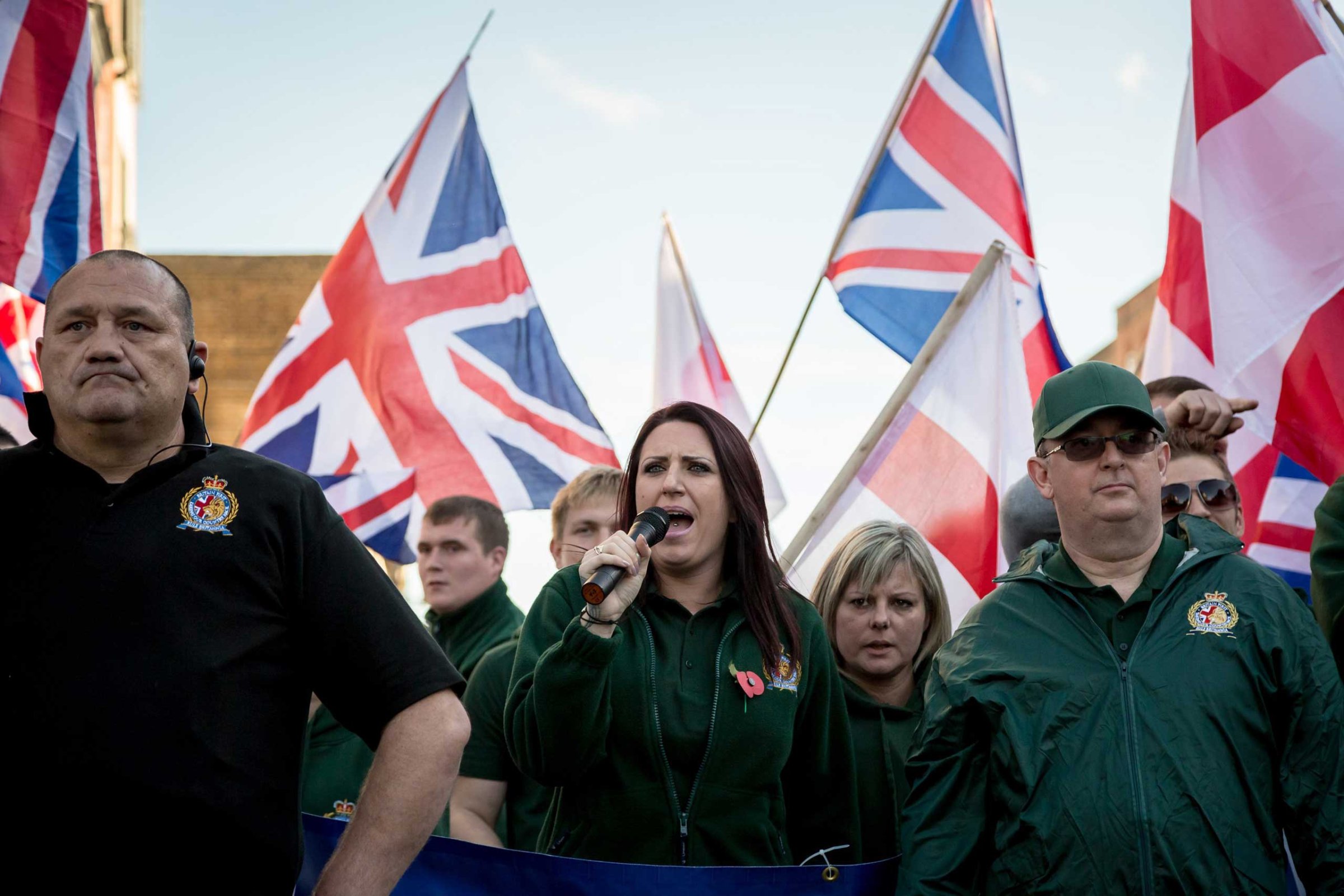
Britain First should be too small and too slapstick to matter, and perhaps it is. The organization has fewer than 1,000 paid-up members according to the U.K. antifascist group Hope Not Hate. Its views lie so close to the outer-right edge of the political spectrum that Britain First’s co-founder and self-styled leader, Paul Golding, describes the U.K.’s governing Conservative party as “left wing.” Nevertheless he rejects a “far right” label. “We deal in right and wrong,” Golding says, and he and his deputy Jayda Fransen go on to prove the second half of that sentence during a lengthy conversation with TIME at a hotel in Dartford, southeast of London.
Yet the doll’s-sized political organization with an extra-large capacity for unintentional comedy has a surprisingly pervasive online presence. If you frequent Facebook, you may well have browsed material posted by Britain First. Perhaps you “liked” or shared Britain First’s posts. That would put you in broad and — if you do not subscribe to Britain First’s politics — befuddled company. Some 22.5 million Facebook users in the U.K. and 43.7 million in the U.S. interacted with Britain First last month. “Even my mother has posted stuff from Britain First on her Facebook page,” says Hope Not Hate’s Matthew Collins, who has written a research paper on the group.
Some of my friends have made the same mistake, liberals and feminists who would in other circumstances recoil from Britain First’s patented brew of Bible-quoting, fear-mongering, foam-flecked foreigner bating and probably wouldn’t be any happier to learn that the online savvy that snared them was honed in the service of U.S. anti-abortion campaigns. Several such friends were among the 273,979 Facebook users to repost a Britain First item earlier this year that purported to show “Muslim girls being lead [sic] off in chains to meet their new husbands”. It would have required only a minute or two on Google to establish that the image had been taken from a passion play staged to mark the Shi’ite festival of Ashura. Still, it’s hardly surprising that the social media platforms that Islamist jihadists are becoming increasingly expert at using to recruit and propagandize should also become the vehicle of an Islamophobic backlash. In both cases, the toxic messages are spread not only by their originators but by innocent dupes.
To understand how this works and to get a clear-eyed view of the nature and aims of Britain First, I asked Golding and Fransen for an interview. This took place on Oct. 31 and at first glance it would have been easy to mistake the pair for trick-or-treaters. They and their burly, shaven-headed bodyguard sport matching clothing from Britain First’s own range of leisure wear-cum-battle fatigues emblazoned with a lion, a union flag and the slogan “taking our country back.” Confusingly, it turns out that Britain First aims to take back more than one country. Golding is in the process of launching America First, a movement aiming to reclaim the U.S., undeterred by the fact he has never visited the U.S. or by the inconvenient fact that the U.S. already boasts a political party called America First, established in 2002 “to put America and all Americans first.” “We have no connection with Britain First and no one from that group has contacted me,” emails Jon Hill, national chairman of the American America First.
Britain First’s America First Facebook page went live on Nov. 3 and this is where any comedy starts to curdle. As of Nov. 6 the new page already had more than 6,000 likes. Its content is similar to the original Britain First site, an inchoate mix of patriotism, Christian imagery and repurposed content from other pages, much of it inviting clicks and shares: “Share if you’re a warrior for Christ”; “Like if you agree: We cannot forget our veterans”; “Clint Eastwood says ‘Obama is a fraud’. Do you agree?”
Well known figures often appear on Britain First’s Facebook page—Benjamin Franklin, Winston Churchill, the Queen. It’s safe to assume Her Majesty’s endorsement hasn’t been sought. A post featuring the British comic actor Rowan Atkinson—best known as the bumbling “Mr Bean”—carries a quotation from a speech he made to the House of Lords in 2005, in opposition to a badly drawn piece of proposed legislation that risked criminalizing mockery of religions. “What is wrong with encouraging intense dislike of a religion? Why shouldn’t you do that, if the beliefs of that religion or the activities perpetrated in its name deserve to be intensely disliked?” Atkinson asked. Of the nearly 5,000 people who “liked” the post, at least some will have assumed Atkinson’s words to be directed against Islam.
Britain First posts frequently on Facebook and its own website, often with a spin on breaking news and a good sense of what may go viral. Hope Not Hate’s Collins ascribes slickness of the operation to Britain First co-founder Jim Dowson, a Briton with marketing skills polished during time spent promoting U.S. anti-abortion groups and also helping to build up the British National Party, a predecessor to Britain First that at its 2009 peak attracted almost a million votes in the European elections. Dowson quit Britain First in July but Golding and his group continue to carry out the online model he established.
There’s little apart from bad punctuation to indicate the gulf between that online presence and the real-world reality: that Britain First are the accident-prone Mr. and Mrs. Beans of the U.K.’s radical political fringes. When the broadcaster Channel 4 shadowed the group, the Britain First Land Rover, theatrically decked in military camouflage, took too speedy a turn into a car park, snapping off the barrier.

Democratic politics both sides of the Atlantic is “a big, giant, meaningless circus” in Golding’s phrase, yet Fransen is standing as Britain First’s candidate in a U.K. Nov. 20 parliamentary by-election caused by the defection of a sitting MP—the appropriately named Mark Reckless—from the Conservative party to the euroskeptic United Kingdom Independence Party, UKIP. Fransen’s message to voters is not what you might expect. “Vote for UKIP,” she says, “because we fully support them.”
If UKIP is queasy about that support—characterizing a photograph of one of its campaigners posing chummily with Fransen as an “ambush”—that’s not surprising. Britain First translates the anti-immigrant rhetoric of UKIP into direct and unpleasant action, participating in so-called “Christian patrols” through areas with significant Muslim populations and staging “mosque invasions.” In May, Golding and four companions barged into the East London Mosque, trampling across prayer mats in their street shoes and demanding to see the imam. “They left in a hurry because there was a traffic warden,” says Salman Farsi, who witnessed the incursion. “He’d pulled up outside to their car and was about to issue a ticket.”
That may seem pretty funny but, says Farsi, “the community is fearful of individuals like this.” Collins suggests the greater risk comes not from Britain First but the responses the group may provoke: “I think they are very very dangerous. Not in the way they would probably like me to say but they are capable of causing a reaction from the people they’re harassing, which would totally outstrip what Britain First is doing.” In May, Britain First surrounded the home of a controversial preacher Anjem Choudary, the former British head of the now banned Islamist group al-Muhajiroun. The British authorities evacuated Choudary and his family. Collins worries that Britain First, far from containing radical Islam, “is acting as a catalyst and recruiting agent for these people.”
The brutal murder in 2013 of off-duty soldier Lee Rigby in London by two assailants, one with links to al-Muhajiroun, certainly helped to kindle the sorts of fears and prejudices towards Muslims that Britain First seeks to exploit. Rigby’s family complained after Britain First co-opted Rigby’s name during the May 2014 European elections, registering the slogan “Remember Lee Rigby.” The U.K. Electoral Commission apologized.
Towards the end of TIME’s conversation with Golding and Fransen, a man who has come to the hotel to use the gym facilities recognizes the Britain First leadership. “What do you stand for?” he asks. “We’re pro-British, we don’t like political correctness, we want our own people put first in our own country, we don’t want mass immigration,” summarizes Golding.
“Does that mean immigrants have to leave then? My wife’s Jamaican,” says the man, kicking off a discussion that becomes increasingly heated. Golding calls his interlocutor “you donut” at one point; the Britain First bodyguard moves to stand menacingly behind the newcomer. The real flashpoint comes when Fransen asserts that immigrants have been given housing that should have gone to ex-servicemen. “I’m an ex-serviceman, don’t talk to me about ex-servicemen. Please do not talk to me about ex servicemen,” says the man who later identifies himself as Geoff (he declines to give his surname), a former paratrooper.
“We’ll talk to you about whatever we want sir, frankly. We’ll talk to you about anything we damn want,” replies Golding, but he’s obviously rattled.
Face-to-face Britain First has no arguments that stand up to Geoff or to other voices of reason. In the online space, the voices of reason are easily drowned out in a flurry of ill-judged “likes” and shares. Always think before you click.
Read next: Russell Brand Joins Thousands in ‘Anonymous’ Protests in London
More Must-Reads from TIME
- Cybersecurity Experts Are Sounding the Alarm on DOGE
- Meet the 2025 Women of the Year
- The Harsh Truth About Disability Inclusion
- Why Do More Young Adults Have Cancer?
- Colman Domingo Leads With Radical Love
- How to Get Better at Doing Things Alone
- Michelle Zauner Stares Down the Darkness
Contact us at letters@time.com